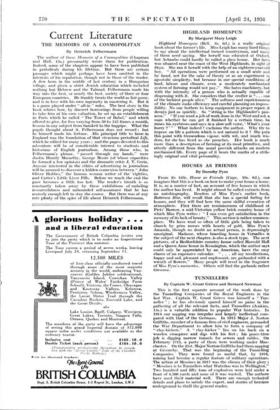TUNNELLERS '
By Captain W. Grant Grieve and Bernard Newman
This is the first separate account of the work done by the Tunnelling Companies of the Royal Engineers in the last War. Captain W. Grant Grieve was himself a " Tun- neller ; he has obviously spared himself no pains in the gathering of all the relevant facts, and Tunnelkrs (Jenkins, 15s.) is a valuable addition to popular War histories. In 1914 our sapping was irregular and largely ineffectual com- pared with that of the Germans. In 1915 Major J. Norton Griffiths, member of a famous firm of civil engineers, persuaded the War Department to allow him to form a company of "clay-kickers." A " clay-kicker " lies on his back on a wooden crosspiece and digs with his feet ;- his peace-time job is digging narrow tunnels for sewers and cables. On February 17th, a party of them were working under Man- chester. On the 21st, Major Norton-Griffiths had them sapping at Givenehy. That was the beginning of the Tunnelling Companies. They were found so useful that, by 1916, mining had become a regular feature of military operations. The action at Messines in 1917 was the climax of their glory : Messines is to Tunnellers what Waterloo was to Wellington." Two hundred and fifty tons of explosives were laid under a front of 4,500 yards and none of it was wasted. The authors have used their material well. There are enough technical details and plans to satisfy the expert, and stories of heroism underground to thrill the general reader.


















































 Previous page
Previous page